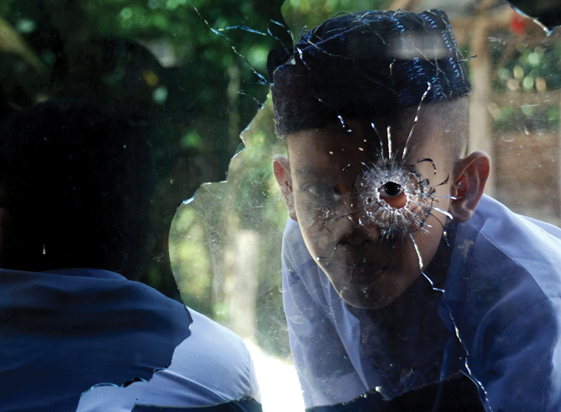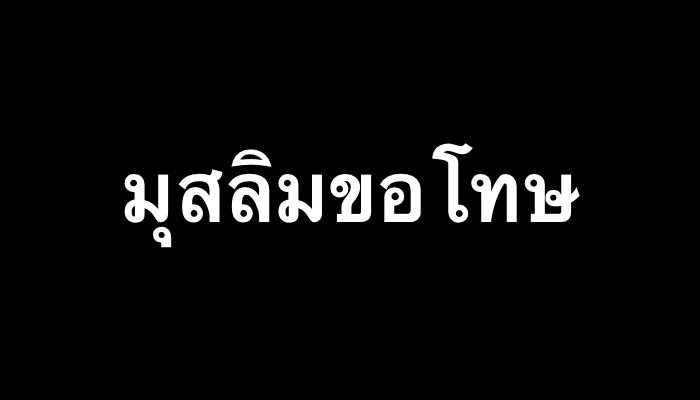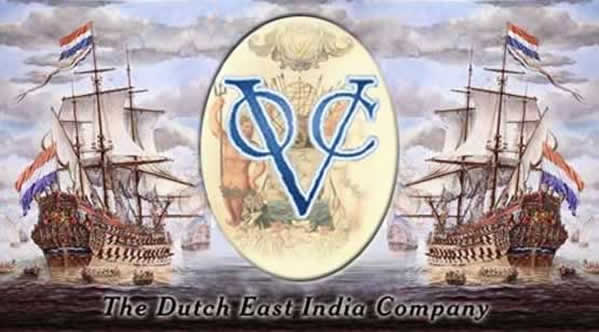สันติภาพปาตานี :บทสนทนาอันไม่รู้จักจบ ?

สันติภาพปาตานี :บทสนทนาอันไม่รู้จักจบ ?
ดอน ปาทาน
PATANI FORUM
เมื่อกล่าวถึงประเด็นของความรุนแรงในภาคใต้ ปฏิกิริยาของทั้งกองทัพไทยและผู้นำทางการเมืองซึ่งยืนคนละขั้วทางการเมืองต่างก็แย่พอๆ กัน
พวกเขาต่างพยายามที่จะโจมตีอีกฝ่ายหนึ่งเพื่อทำลายความน่าเชื่อถือมากกว่าที่จะมองถึงการแก้ไขปัญหาความขัดแย้งในสามจังหวัดชายแดนภาคใต้อย่างจริงจัง
พรรคประชาธิปัตย์และกองทัพไม่ได้รีรอที่จะโจมตีรัฐบาลหลังจากที่ได้รู้ว่าอดีตนายกรัฐมนตรีทักษิณ ชินวัตรซึ่งยังคงหลบหนีอยู่นอกประเทศนั้นได้พบกับกลุ่มผู้นำรุ่นเก่าของขบวนการแบ่งแยกดินแดนของปาตานีหลายกลุ่ม
ควรจะกล่าวไว้ในที่นี้ว่า รัฐบาลในอดีตหลายรัฐบาล ตัวแทนองค์กรหลายแห่ง และแม้กระทั้งเจ้าหน้าที่ทหารระดับสูงได้พยายามที่จะพูดคุยหรือเจรจากับกลุ่มแบ่งแยกดินแดนตั้งแต่ช่วงปีทศวรรษที่ 1980
ในครั้งแรก กองทัพเป็นผู้ริเริ่ม แต่ว่าการพบปะกับกลุ่มแบ่งแยกดินแดนเหล่านี้ไปได้ไม่ไกลเกินกว่าการเป็นข่าวและการแสวงหาข่าวกรอง
ในช่วงปลายปีทศวรรษที่ 1980 และต้นทศวรรษที่ 1990 ปีกที่ติดอาวุธของขบวนการเคลื่อนไหวแบ่งแยกดินแดนได้ล้มเลิกการเคลื่อนไหว ผู้นำของพวกเขาหลายคนก็ยังคงลี้ภัยอยู่นอกประเทศ ซึ่งตั้งแต่ปี 2004 กลุ่มขบวนการแบ่งแยกดินแดนเหล่านี้ซึ่งได้เคยพบกับทหารเมื่อกว่าสองทศวรรษที่แล้ว ได้กลับมาสร้างบทบาทให้ตัวเองอีกครั้ง พวกเขาพยายามที่จะเข้าไปให้ถึงขบวนการรุ่นใหม่ที่อยู่ในพื้นที่ ซึ่งเรียกกันในท้องถิ่นว่า “ยูแว” และกลุ่มประชาสังคมในสามจังหวัดชายแดนภาคใต้
แต่ว่ากลุ่มที่มีความสัมพันธ์ในการทำงานร่วมกับกลุ่มยูแวได้ดีที่สุดนั้นเชื่อว่าคือกลุ่มบีอาร์เอ็น-โคออดิเนท ความท้าทายสำหรับรัฐบาลไทยก็คือการระบุว่าใครคือคนของบีอาร์เอ็น-โคออดิเนทที่ “แท้จริง” เพราะว่ามีมากกว่าหนึ่งกลุ่มซึ่งใช้ชื่อเดียวกัน พวกเขาอาจจะมีเอกภาพร่วมกันเมื่อสามทศวรรษก่อน แต่ว่าในทุกวันนี้มีแกนนำหลายคนที่มากล่าวอ้างว่าเป็นหัวหน้าของกลุ่มนั้นกลุ่มนี้ ดูตัวอย่างกลุ่มพูโลเป็นต้น มีแกนนำสามคนที่อ้างว่าตัวเองนั้นเป็นประธานของพูโล ส่วนกลุ่มบีอาร์เอ็น-โคออดิเนทก็ไม่ต่างกันเท่าใดนักในประเด็นนี้
นายฮัสซัน ตอยิบเป็นคนหนึ่งที่นั่งอยู่ข้างๆ อดีตนายกฯ ทักษิณในการประชุมลับเมื่อวันที่ 17 มีนาคม 2555 เขาเป็นคนหนึ่งที่อ้างตนว่าเป็นแกนนำของกลุ่มบีอาร์เอ็น-โคออดิเนทและเขาก็ได้พยายามที่จะเข้าหาทางการไทยในช่วงหลายปีที่ผ่านมา รวมถึงการผ่านอดีตนายกรัฐมนตรีชวลิต ยงใจยุทธ เพราะเขาต้องการที่จะมีบทบาทในการพูดในฐานะตัวแทนของคนปาตานี
แต่ว่าสิ่งหนึ่งที่เป็นสิ่งบ่งชี้ว่าความพยายามของทักษิณนั้นสูญเปล่าก็คือข้อเท็จจริงที่ว่าแกนนำของกลุ่มในบีอาร์เอ็น-โคออดิเนทซึ่งเป็นกลุ่มที่มีความสัมพันธ์ที่ใกล้ชิดกับพวกยูแวที่สุดนั้นตัดสินใจคว่ำบาตรการประชุมร่วมกับตัวแทนของพรรคเพื่อไทย/กลุ่มเสื้อแดง
เมื่อถามว่าทำไมพวกเขาจึงปฏิเสธที่จะพบทักษิณ ตัวแทนของบีอาร์เอ็น-โคออดิเนทกลุ่มนี้กล่าวว่าพวกเขาไม่เคยให้อภัยกับสิ่งที่อดีตนายกฯ ทักษิณได้ทำไว้กับคนมลายูปาตานี นโยบายของทักษิณในกรณีสามจังหวัดชายแดนภาคใต้นั้นเป็นเรื่องหนึ่งซึ่งเป็นที่วิพากษ์วิจารณ์อย่างมาก
กลุ่มที่เคลื่อนไหวอยู่ในปัจจุบันได้ปรากฏตัวตั้งแต่ปี 2544 ซึ่งเป็นช่วงที่ทักษิณขึ้นสู่อำนาจ แต่ว่าทักษิณไม่ได้ยอมรับการดำรงอยู่ของพวกเขาและได้เรียกพวกเขาว่า “โจรกระจอก” ทัศนคติเช่นนั้นเปลี่ยนไปหลังจากที่พวกเขากลุ่มหนึ่งได้บุกโจมตีค่ายทหารในจังหวัดนราธิวาสในวันที่ 4 มกราคม 2547 พร้อมทั้งขโมยปืนทหารไปอีกกว่า 350 กระบอก
ในปลายปี 2548 ทักษิณในฐานะนายกรัฐมนตรีในขณะนั้นได้เปิดไฟเขียวให้มีการเจรจาหลายรอบกับกลุ่มแบ่งแยกดินแดนที่ลี้ภัยอยู่นอกประเทศ ในส่วนของรัฐบาลไทยนั้นก็มี พล.ท. ไวพจน์ ศรีนวล ซึ่งขณะนั้นดำรงตำแหน่งเป็นผู้อำนวยการศูนย์รักษาความปลอดภัย (ศรภ.) และพล.อ.วินัย ภัททิยกุล เลขาธิการสภาความมั่นคงแห่งชาติ (สมช.) เป็นตัวแทน การพบกันนั้นเรียกกันว่า “กระบวนการลังกาวี” ซึ่งตั้งชื่อตามเกาะซึ่งเป็นสถานที่ที่การประชุมกันได้เกิดขึ้น
กระบวนการลังกาวีได้นำไปสู่ข้อเสนอจำนวนหนึ่งซึ่งได้ส่งถึงมือของนายกรัฐมนตรีทักษิณในขณะนั้นผ่านอดีตนายกรัฐมนตรีอานันท์ ปันยารยุน แต่ว่าทักษิณนั้นมัวแต่ยุ่งอยู่กับการประท้วงของกลุ่มเสื้อเหลืองซึ่งกำลังปะทุขึ้นในกรุงเทพฯ
หลังจากการรัฐประหารในปี 2549 พล.อ.สุรยุทธ์ จุลานนท์ซึ่งเป็นนายกรัฐมนตรีในขณะนั้นได้ให้ไฟเขียวกับหน่วยงานของรัฐที่เกี่ยวข้องเพื่อหาหนทางยุติความขัดแย้ง นอกเหนือจากการใช้วิธีทางการทหาร ซึ่งหมายถึงว่าหากจำเป็นที่จะต้องเจรจากับขบวนการแบ่งแยกดินแดนก็ควรจะทำ
ในเดือนกันยายน 2551 นายยูซุฟ คัลลา ซึ่งเป็นรองนายกรัฐมนตรีอินโดนีเซียในขณะนั้นได้มีโอกาสทำหน้าที่เป็นตัวกลางในการพูดคุยระหว่างกลุ่มที่อ้างว่าเป็นตัวแทนของกลุ่มแบ่งแยกดินแดนในปาตานีและตัวแทนของกองทัพไทย แต่เมื่อการประชุมถูกเปิดเผยกับสาธารณะ รัฐบาลไทยก็ยุติการดำเนินการในทันที
พล.อ.สุรยุทธ์เองก็ได้ไปพบกับบุคคลคนหนึ่งที่อ้างตัวเองว่าเป็นตัวแทนของกลุ่มพูโลในเดือนธันวาคม 2550 ก่อนที่เขาจะก้าวลงจากตำแหน่งนายกรัฐมนตรีเพียงไม่กี่เดือน
ในช่วงของรัฐบาลสมัคร สุนทรเวชและสมชาย วงศ์สวัสดิ์ การพูดคุยเพื่อสันติภาพอยู่ในภาวะชะงักงัน เพราะว่าพวกเขาวุ่นวายอยู่กับการแก้ไขปัญหาการชุมนุมประท้วงที่กรุงเทพฯ
ในยุคที่นายอภิสิทธิ์ เวชชาชีวะเป็นนายกรัฐมนตรี ทางสภาความมั่นคงแห่งชาติได้ทำหน้าที่ดำเนินการเรื่องพูดคุยอีกครั้งหนึ่งซึ่งต่อมาได้ถูกระงับภายหลังจากที่รัฐบาลของนางสาวยิ่งลักษณ์ ชินวัตรหันไปสนับสนุนให้นายทวี สอดส่อง เลขาธิการศูนย์อำนวยการบริหารจังหวัดชายแดนภาคใต้ ซึ่งเป็นข้าราชการที่เป็นที่ใกล้ชิดกับพรรคเพื่อไทยได้ทำหน้าที่นี้แทน
นับแต่กระบวนการลังกาวีในปี 2548 จนถึงการพูดคุยระหว่างทักษิณกับขบวนการแบ่งแยกดินแดนเมื่อเร็วๆ นี้ พวกยูแวและกลุ่มบีอาร์เอ็น-โคออดิเนทไม่ได้เข้าร่วมวงพูดคุยเหล่านี้เลย แหล่งข่าวในบีอาร์เอ็น-โคออดิเนทได้พูดว่าพวกเขาไม่เคยให้อภัยทักษิณและสิ่งที่เขาทำกับคนมลายูในปาตานี แต่ว่าพวกเขาไม่ได้ปฏิเสธการพูดคุยกับพวกคนไทย
ถ้าหากว่าพรรคประชาธิปัตย์ พรรคเพื่อไทยและกองทัพนั้นเชื่อว่าชีวิตของประชาชนในภาคใต้นั้นสำคัญกว่าอีโก้ของพวกเขา พวกเขาจะต้องหยุดทำให้เรื่องการพูดคุยกับผู้เห็นต่างเป็นเรื่องการเมือง ถึงที่สุดแล้ว พวกเขาทั้งหมดต่างก็ทำเช่นนั้น
สิ่งที่ควรจะทำในตอนนี้ก็คือการลดความเป็นการเมืองของกระบวนการนี้เพื่อให้การพูดคุยกับพวกกลุ่มเก่าผู้อาวุโสเหล่านี้ดำเนินไปได้ โดยหวังว่าพวกเขาจะสามารถที่จะทำหน้าที่ในการเชื่อมต่อกับกลุ่มยูแวในพื้นที่ได้ สมาชิกของภาคประชาสังคมและข้าราชการที่เกษียณแล้วควรที่จะเป็นผู้ที่ทำให้กระบวนการนี้เดินต่อไป แทนที่จะเป็นนักการเมือง เพื่อที่จะทำให้กระบวนการนี้เป็นเรื่องซึ่งไม่ลำเอียงให้มากที่สุดเท่าที่จะทำได้
มันคงจะไม่ได้เป็นเรื่องง่ายนัก เหตุการณ์ระเบิดคาร์บอมบ์สามลูกในยะลาและหาดใหญ่ซึ่งทำให้มีคนบาดเจ็บหลายร้อยคนและเสียชีวิตมากกว่าสิบคนแสดงให้เห็นว่าพวกยูแวนั้นไม่ได้อยู่ในภาวะที่ต้องการจะพูดคุย การไล่ล่าและเอาชีวิตพวกเขาก็ไม่ประสบผลสำเร็จเพราะว่าทหารและเจ้าหน้าที่ความมั่นคงของเรานั้นไม่มีความสามารถ
แต่แทนที่จะยอมรับถึงความบกพร่องและการถือเอาประโยชน์ของประชาชนเป็นที่ตั้ง นายทหารระดับสูงและผู้กำหนดนโยบายกลับมองถึงแต่การหาแต้มทางการเมืองแทนที่จะมองถึงความเป็นจริงที่ว่าพวกเขาต่างก็แย่พอๆ กันในเรื่องของความสามารถในการรักษาความมั่นคง
หมายเหตุ : สำหรับรายงานเกี่ยวกับสถานการณ์ความขัดแย้งในจังหวัดชายแดนภาคใต้ของประเทศไทย โปรดดู http://seasiaconflict.com/
Thaksin, Thailand and the Secret Talks with Patani-Malay Separatist Movements
By Don Pathan
PATANI FORUM
The reaction by the Thai military and political leaders from both sides of the divides have been nothing less than appalling when it comes to the violence in the deep South.
They appeared to be more eager to discredit one another rather then genuinely looking for ways to end the conflict in the three southernmost provinces once and for all. The Democrats, as well as the Army, didn't waist time attacking the government after it was discovered that fugitive Thaksin Shinawatra had met a group of exiled leaders from various Patani Malay separatist movements.
For the record, numerous government administrations, agencies, and top military officers have held talks or negotiation with the separatists for since the early 1980s.
At first it was the Army. But their encounters with the separatists leaders never went beyond news and intelligence gathering, thus, explained why the outcome of these activities have had no bearing on national policy towards the Malays in the three southernmost provinces.
Around the late 1980s and early 1990s, the armed wings of these separatist movements went under. Many of their leaders remained in exiled.
Since 2004 these same separatist leaders who had been meeting the Thai Army officers two decades ago began to reinvent themselves. They have been trying to reach out to the new generation of insurgents on the ground, locally known as juwae, as well as the civil society in the three southernmost provinces.
But the group with the best working relationship with the juwae is said to be the Barisan Revolusi Nasional-Coordinate (BRN-Coordinate). The challenge for the Thai authorities is to determine who are the “real” BRN-Coordinate because there are more than one groups who are using the same organizational name. There may have been unity three decades ago but today, there are various self-proclaimed leaders of this and that group. The Patani United Liberation Organization (PULO), for example, has three different leaders claiming to be the president of the organization. BRN-Coordinate is no different in this respect.
Sitting next to Thaksin during the secret meeting on March 17, 2012 was Hasan Thoyib, a self-proclaimed BRN leader who has been trying over the years to reach out to the Thai authorities, including former Prime Minister Chavalit Yongchaiyudh, because he wanted the mandate to speak on behalf of the Malay of Patani.
But the one indication that Thaksin's effort would be fruitless was the fact that the leaders of the BRN-Coordinate - that faction with the best working relationship with the juwae - decided to boycotted the meeting with the de facto leader of the Red Shirt/Pheu Thai Party.
When asked why the group decided to refused to meet Thaksin, a member of this BRN-Coordinate faction said they could never forgive the former Thai prime minister for all the things he has done to the Malays of Patani. Thaksin's policy over the three southernmost provinces was one of the most controversial.
The current generation of militants surfaced in 2001, about the time Thaksin came into power. But Thaksin didn't want to recognize them and so he called them “sparrow bandits”. That attitude changed after scores of them raided a military base in Narathiwat on January 4, 2004, making off more than 350 pieces of military weapons.
The new generation called themselves “juwae”, or fighters in local Malay dialect, and their leaders are said to have regular dialogue with members of the BRN-C, one of the long standing separatist groups that surfaced in the late 1960s. Sources in the BRN movement said a shared command is still a thing of the future.
In late 2005, the then premier Thaksin gave a green light to a series of negotiation involving the exiled separatist leaders. Representing Thailand was the then Armed Forces' Security Centre chief Lt-General Vaipot Srinuan and General Winai Pathiyakul, head of the National Security Council (NSC). The encounters was referred to as the Langkawi Process, named after the Malaysian island where the meetings were held.
The Langkawi Process produced a set of recommendations handed to former prime minister Anand Panyarachun who forwarded to Thaksin. But Thaksin was too busy with the Yellow Shirt demonstrators that was brewing up in Bangkok.
After the coup in 2006, the then premier Surayud Chulanont gave the green light to every relevant government agencies to seek non-military means to end the conflict. This mean negotiate with the separatists if one has to.
In September 2008, the then Indonesian Vice Presdient Jusuf Kalla was also given a chance to mediate a talk between self-proclaimed Patani Malay separatist leaders and a representative from the Thai Army. But when the meeting went public, Bangkok immediate backed away.
Surayud himself went and met with one of the self-proclaimed PULO leader in December 2007 just weeks before he stepped down from the premiership.
Peace talks process was stalled during the Samak Sundaravej and Somchai Wongsawat administrations because they were too bogged down with the demonstrations in Bangkok.
During the Abhisit Vejjajiva administration, the NSC was brought into the picture again to head a dialogue process that ended when the current administration of Yingluck Shinawatra decided to throw its weight behind their favourite bureaucrats in the deep South, Thawee Sodsong, the current chief of the Southern Border Provinces Administrative Centre (SBPAC).
Since the Langawi Process in 2005 up to the recent meeting between Thaksin and the separatist leaders, the juwae and the BRN-Coordinate were not represented. Sources in the BRN-Coordinate have said they could never forgive Thaksin and his affiliates for what they have done to the Malays of Patani but did not ruled out talks with the Thais.
If the Democrats, the Pheu Thai and the army believe the lives of the people in the deep South are more important than their ego, they need to stop politicizing this idea of talking to the enemies. After all, they all have done it one time or another.
What is needed now is to depoliticize the process so that the dialogue with the old guards continues with the hope that these exiled leaders could serve as the link to the juwae on the ground. Members of the country's civil society and retired bureaucrats could keep this process alive, instead of the politicians, in order to make as inclusive and nonpartisan as much as possible.
It won't be easy. The recent triple bomb in Yala that injured over 100 and killed over ten have shown that the juwae are not in the mood to talk, especially to Thaksin and his represenatatives. Hunting them down and killing them haven't work because our military and security apparatus are not up to the task.
But instead of admitting their shortcomings and putting the interest of the people first, our top brass and policy makers rather look for ways to score political points in spite of the fact that they are all equally pathetic when it comes to meeting this security challenge.
Note: For more coverage of the insurgency in Thailand's southernmost provinces, please visit: http://seasiaconflict.com/






